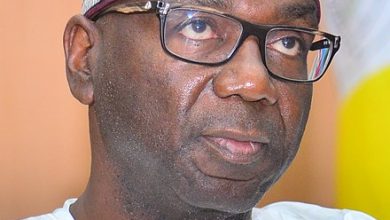IVTEC: An enduring legacy of Governor Ahmed

Some 17 months from now, His Excellency, Dr Abdulfatah Ahmed would have finished his race and handed over the baton he received from his predecessor, Dr. Bukola Saraki, as the Executive governor of Kwara state, to another worthy successor, Insa Allah. He shall immediately relocate from the Executive mansion at Ahmadu Bello Way, shed the toga of authority signified by the heavy security and protocols around him, and take up the life of an ordinary man once again. That is the nature of political office. My prayer is that the Almighty Allah, in His infinite mercy, provides another resourceful, pragmatic, cerebral and God-fearing person for us. I hope to return to this subject of a worthy successor in no distant time.
Though he shall leave office like all mortals, his works shall not leave. They shall live after him. There exist today, landmark structures that shall continue to speak of the Ahmed years in office; being part and parcel of a phenomenal change that happened to Kwara in the Continuity Years that began with the emergence of Dr. Bukola Saraki as the executive governor of the state, in 2003. In this series, I stand to place before posterity the modest efforts being made by the Ahmed administration to make Kwara a better place than he met it.
Seeing, science and politics dictate to us, is believing. And one of the legacies of the Ahmed years that can be seen and believed, is the International Vocational Training and Entrepreneurship College, IVTEC, built in Ajase-Ipo, among his people of Kwara South , for the benefit of all Kwarans in particular and Nigerian in general. As a governor, he has not abandoned his people as demonstrated by a number of projects. Unlike Senators, Houses of Representatives and State Assembly members, the entire state is the governor’s primary constituency. Pessimists may deride it for political exigency, as they desimised the International Aviation College and the Harmony Diagnostic Centre built by Senate President Bukola Saraki as a Governor of the State, those who benefit from it, know the difference it makes in their professional savior-faire.
Yes, it took years to complete, due to conceptualisation challenges and operational demands of its professional standard, but today, the edifice not only stands but has been commissioned and admitting students. Yet the glory is not in the mere commissioning. The attention of the world must be on the vision behind the project. It was the vision that caught the attention of the erudite lawyer, scholar and Vice President of Nigeria, Professor Yemi Osinbajo that made him pledged to recommend its replication to other states of the federation. Surely, the Senior Advocate is not a man given to vain words. He is not a noise maker. Not even for political reasons.
Although it offers vocational and technical training, IVTEC is not the usual Technical College you see every where. It is not targeted at providing academic technical education, the likes of which many of our schools would offer but which make their graduates unemployable. The vision is to provide hands-on training to students and equip them to be internationally relevant in their chosen areas of expertise. That is why the number of students enrolment per stream is limited. That is why the school is affiliated to the renowned City and Guild of London. That is why the school is not to be funded like the Technical Colleges of old which could not last even the tenure of their founding administrations but collapsed and have become history today across Nigeria.
One fundamental difference about the school is its funding structure. Asked why he changed the funding concept for the school while appearing on his interactive Radio programme, The Governor Explains, “our plan to set IVTEC in the first place is as a result of the need to create a training ground for middle manpower needs and development plan because we currently don’t have such institution in the country. Most importantly, if you look at the typical colleges that were introduced in the past, most of them have either gone moribund or largely being converted to regular secondary schools.
“If you look at where we require artisans to work, especially in the construction sector, we rely heavily on people coming from other West Africa Sub-region. These are parts of reasons why we set up the school. Now, how will the school run differently from what we used to have in the past? Where are the government technical colleges, where are the government owed institutions that are expected to drive entrepreneurship across the country? They are all gone. They are all dead.
“So, our desire to set up a vocational training institution that will not go the ways of the past ones was responsible for the funding and managing models of the IVTEC. One great challenge of the dead ones was largely recurrent expenditure. Government spent money every time, set up an institution, equip it and that is where it ends. How do they run from there? Who provides the bills? Who runs the bill payment?”
Obviously, capacities by states to drive institutions on a day- to- day basis is becoming herculean either at the basic, secondary or tertiary levels. We are all witnesses to what is happening between ASUU and the federal government and between states government and their higher institutions. These are testimonies that capacity of government to continue to run institutions on recurrent levels is challenging. No wonder the state government conceptualised the issue of setting up an International Vocational Centre that would run as an NGO.
A non-governmental organisation model run institution will run itself by latching on International Organisations and donor agencies that will give it enough funding to sustain and subsist. The institution, if properly administered, will get support from a lot of development partners. So, the whole idea of registering it as an NGO is to create a sustainability platform.
“It will continue to be owned by government, but it is going to be run as an NGO. That is the only way it will become attractive to international agencies who will now donate fund or endow chairs in those institutions”, the governor explained. “If we rely on the state government to set up a school, run it the normal way it is runs every other school, we will have challenges. Even the current boarding system we have in schools is not even sustainable. We are struggling to sustain the Kwara State University. So, it will be fool hardly to assume that we will just set up any other institution under the same programme to be running under the same funding window. Obviously, it will also die like the others in the past. So, the only way to make it sustainable is to create a way and a manner that is different; that would insulate it and make it attractive to funding agencies outside the country and other development partners.
The World Bank has keyed in to the project, in justification of the governor’s postulation. The global body has agreed to sponsor 17,000 students at the College over a period of years. The state government is also set to sponsor five students from each of its 16 local government areas every year. That is 80 students every year. They will not pay school fees, along with the selected World Bank beneficiaries and end up adding value to our local and national economy. The beauty of it all is that the selection criteria would have nothing to do with politics, or influence. This settles the concern of stakeholders who keep harping on the N400, 000 school fee at IVTEC as elitist. All what is needed is for your ward to meet the requirement laid down by the World Bank and the state for qualifications into their respective schemes.
If other states and organisations key-in into this approach, the school is assured of regular student enrolment for several years to come, payment of workers’ salaries and operational activities at IVTEC would not depend on cash flow from a regularly dwindling federation account, and most happily our youths would have been taught how to fish for themselves in the wide ocean of artisanal engagement, instead of waiting on dole out for the good boys. This, surely, will be a lasting legacy of the Ahmed years.




